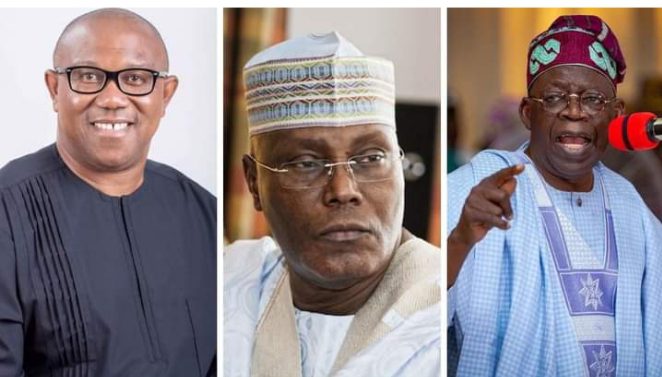Democracy & Governance
Tinubu, Atiku, Obi; Who saves us from planting on a land tuned to acidity? -By Aminu Zainab Kofoworola
The main opposition, the People’s Democratic Party, has renominated its 2019 flagbearer and former vice-president (1999 – 2007), Atiku Abubakar. The nominee is also a northern Muslim and despite his nomination of a southern Christian governor as his running mate, he faces in-fighting within his party for marginalizing the south.

It is glaring enough the state of the country’s disintegration. The rate at which the unemployment graph climbs unpredictable heights. The belief of a failed government, the regret of swapping a few coins for our thumbprints, or our dance to the music of deceit and our fall for the sugarcoated lips of those curious to hold offices. We’ve been made to submit another cycle of governance to the wrong hands due to our craving for a derica of rice or a sachet of Semovita, which has been the way politicians who want people to vote for them, bribe the elites.
The street ways have become the means of survival for many, who have lost total trust in the government and expect little to nothing. Tenures, and years have passed but we only hear of hefty figures traveling through the pockets of those we elected. It is everyone fighting for survival and sometimes striving to win at all costs, just to drive riches that seem out of reach. This leaves every youth with excuses of proudly indulging in the dubious act and keyboard tricks which is popular today as YAHOO. The words outside the nation claiming our country to be the Giant of the African country are youths, adults, and teens splenetic in their rants and behavior, our disintegration coming at a cost of self-centered governance. Now, who do we call for help?
During the electioneering campaign, the people’s general, who shall forthwith be addressed as President Muhammadu Buhari; his vice president, Yemi Osinbajo; and other top members of the party, made lots of promises to Nigerians. Did the APC, Buhari, and Osinbajo keep their promises to Nigerians? Or would their administration end up like the quote of Greek author, Aesop, who said: “When all is said and done, more is said than done”?
The party’s campaign was based on the catchword “CHANGE” and was implemented in a most spiteful, abrasive, and propagandistic forcefulness that crowded out every message of the then-ruling Peoples Democratic Party (PDP) and its President, Goodluck Jonathan. From the reports published by different media organizations, we were able to extract 73 key promises made by the party in its much-touted “Change” campaign and the analysis showed the APC failed woefully in fulfilling them. Who do we blame?
At the newspaper man close to my house, When the headlines of morning papers are laid on the table of the seller, only for grown men to strike up arguments. Responses hit from nowhere, either by passersby or eavesdroppers, each of them with a story to tell. While some state facts and others come with rumors or dining table myths shared by their parents for decades.
The conversations of these men raged for hours. As many take turns while others remain blunt out of frustration. I long waited for the end of this discussion, till the newspaper man made all sales. They all arrived at a conclusion you would have never thought, “E go soon better”(things will get better), a word that has helped us procrastinate our struggles and wrong decisions. This word has pampered our leaders and put them in their comfort zones because we’ve found a way to always endure a Scorpion sting only to sit and discuss how democracy has disappointed the masses.
In about four months, Nigerians will know the leaders who will preside over their affairs for the next four years. The ruling party, the All Progressives Congress, has nominated Bola Tinubu, former governor of Lagos State (1999 – 2007) and a well-known fixture in Nigeria’s political scene. A southern Muslim, he has since nominated a northern Muslim, Kashim Shettima, to be his vice president, fuelling the ire of many who warn against Christian marginalization if he is successful. His well-known statement ‘E Mi Lokan (It is my turn in Yoruba)’ has also been used as a rallying cry for Yorubas from the South-west seeking the presidency primarily based on ethnic representation.
The main opposition, the People’s Democratic Party, has renominated its 2019 flagbearer and former vice-president (1999 – 2007), Atiku Abubakar. The nominee is also a northern Muslim and despite his nomination of a southern Christian governor as his running mate, he faces in-fighting within his party for marginalizing the south. Most permutations favor these two candidates since their parties have produced past presidents and control all but one of the nation’s state governorships. But there is a factor expected to play a role in the coming election, a growing youth population prepared to leave a mark in shaping the future of the country. The increasing population of young voters and the growing impact of social media in the country are reasons why there is optimism about Peter Obi, the former governor of Anambra State (2006, 2006 – 2014) and presidential nominee of the Labour Party. Most of his appeal stems from his increased engagement with Nigerians on social and conventional media and his relative youth – if elected, he would be the first president born after the country’s independence. Obi is still tainted by hallmarks of politicians of this era – he too has moved across parties to actualize political ambitions and was implicated in the Pandora Papers data dump. But his willingness to engage with citizens has ensured that he stands out from the crowd and his performance will be monitored to see the impact of the youth vote and if he can increase turnout.
Now, the question that begs for answers is stuck in my mind. Who saves us from planting our seed on a land tuned to acidity?



















